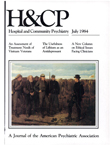A Study of Medication Refusal by Involuntary Psychiatric Patients
Abstract
The authors evaluated 31 patients consecutively admitted to a locked acute treatment unit in California to determine the severity of their symptomatology, their attitudes toward treatment, and whether they would refuse medication if they had the opportunity (patients in California do not have the right to refuse). Fifteen patients indicated that they would refuse medication if given the opportunity. Although they did not differ in diagnosis from the other patients, they showed evidence of more severe psychosis and higher mood elevation and bad less positive attitudes toward treatment. Two-week follow-up of 12 patients in the refuser group showed that they were less likely to refuse drugs and were clinically improved; however, six of the patients still preferred to refuse medication despite their clinical improvement. The authors discuss their findings in the context of the broader issue of when a mentally ill person should be forced to give up the power to make decisions about drug treatment.
Access content
To read the fulltext, please use one of the options below to sign in or purchase access.- Personal login
- Institutional Login
- Sign in via OpenAthens
- Register for access
-
Please login/register if you wish to pair your device and check access availability.
Not a subscriber?
PsychiatryOnline subscription options offer access to the DSM-5 library, books, journals, CME, and patient resources. This all-in-one virtual library provides psychiatrists and mental health professionals with key resources for diagnosis, treatment, research, and professional development.
Need more help? PsychiatryOnline Customer Service may be reached by emailing [email protected] or by calling 800-368-5777 (in the U.S.) or 703-907-7322 (outside the U.S.).



